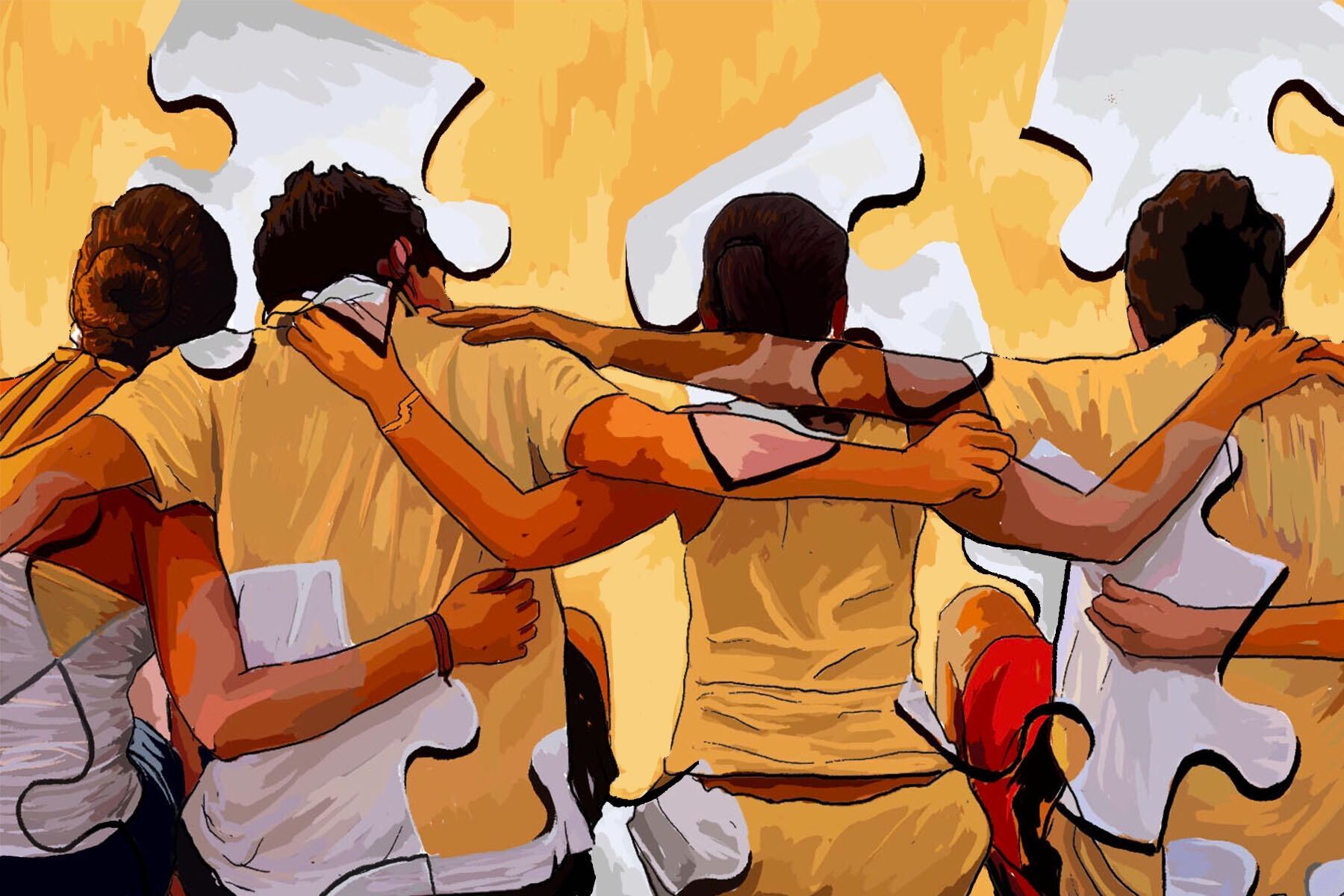Good podcast episodes — ones that really do their job — create images that will stay in your mind long after you’ve listened to it, similar to the way staring at the sun for too long will cause blotches of color to appear in your line of vision. For me, these episodes often dive into the complexity of human relationships, telling stories so personal they exist a world away, but with details so rich they possess life of their own.
In the middle of a pandemic, connecting with other people — real, living, germ-producing people — has never seemed more difficult. Even with the ability to reach almost anyone via a phone call or Zoom link, the current shortage of hugs and lack of people dawdling on sidewalks make life feel incredibly sparse and distanced.
Podcasting, a form of human connection itself, allows listeners to engage with a simple but intimate form of storytelling: a stranger’s voice transmitted directly through their AirPods or chewed-up earbuds they bought from the gas station two years ago on the way home from work. Either way, podcasts keep people company while folding laundry and provide a distraction during the hold-your-breath moments that take place before taking a scrub brush to the inside of a toilet bowl.
Amidst a global pandemic, podcast episodes can also offer something else: a glimpse of what life looked like before social distancing. While connecting with others may have looked vastly different just six months ago, that doesn’t mean it happened easily — instead of trying to decipher someone’s facial expression under a mask, we speculated whether the person of our dreams liked us back.
These four podcast episodes, recorded in a time when people didn’t use words “social” and “distancing” in the same sentence, remind listeners that while human connection will always be messy, life will be more meaningful because of it.
1. “Boy What a Fabulous Baker” on “Modern Love”
Crushes exist way beyond the confines of high school in the “Modern Love” podcast episode titled “Boy What a Fabulous Baker.” Released in 2016, the “Modern Love” podcast features essays written by everyday people about the complexity of all types of love and relationships. Some of today’s notable actors and actresses read the essays, which were originally published in The New York Times’ “Modern Love” column. With the help of voices like those of Saoirse Ronan and Terry Crews — in addition to ambient background music — personal essays about love cleave from the page to form a life of their own.
“Boy What a Fabulous Baker,” an essay written by Betsy Vereckey and read by Abbi Jacobson of “Broad City,” recounts Vereckey’s encounters with a local baker who she develops a crush for after eating a slice of his homemade bread. Vereckey, recently divorced at the time, goes back to the bakery week after week — for the baker and his pastries — in hopes that she’ll walk out with a date. When nothing happens, Vereckey decides to break traditional gender roles and ask the baker out herself.
A bite-sized podcast episode, “Boy What A Fabulous Baker” can be listened to in under 20 minutes, keeping readers engaged with its straightforward plot and relatable topics like stomach butterflies and the fear of rejection.
Though don’t be mistaken, “Boy What a Fabulous Baker” doesn’t fall into the category of cliché girl-likes-boy stories. Vereckey writes vividly about the baker’s idiosyncrasies that make her heart beat faster: a beard perfect for picking up breadcrumbs and sinewy forearms that resemble challah bread. Vereckey’s encounter with the baker restores faith in the laws of attraction, emphasizing the small and particular things that lead to a crush.
2. “The Living Room” on “Love + Radio”
In the podcast episode “The Living Room,” Diane Weipert shares a personal story involving her observations of a young couple who live in an adjacent apartment building. Weipert, initially frustrated by the couple’s failure to buy curtains, slowly becomes curious about their lifestyle. Without their knowledge, she watches the couple embody what it means to be young and in love as they wake up late and eat breakfast on the roof.
Things become less romantic, though, when tragedy strikes, causing the couple to look mortality straight in the eye. Weipert watches them — a little obsessively — as they endure a heartbreaking journey, hoping the ending will turn out well.
Aired in 2015 on the “Love + Radio” podcast, “The Living Room” divided listeners into those who got choked up by Weipert’s care and concern for the couple and those who deemed her actions unethical and creepy. In the podcast episode, Weipert describes them as well-intentioned.
“She [the neighbor] doesn’t know that there’s this complete stranger that’s out there really rooting for her,” Weipert said.
While some may be put off by “The Living Room,” in a strange way, it can be comforting to think about all the people out there, even those you’ve never met, who may be invested in your story, hoping it turns out well. Not to mention the episode also serves as a reminder that people can feel connected more than six feet apart from each other — Weipert certainly did, and she lived an entire building away.
3. “No Coincidence, No Story!” on “This American Life”
With 66,000 ratings on Apple Podcasts and over 2.2 million weekly listeners, “This American Life” may very well be the apple pie of podcasts. Created by host Ira Glass in 1995, “This American Life” delivers weekly themed podcast episodes with both real and fictional stories centering around a certain topic. Since its inception, the podcast has covered just about everything under the sun, from selling cars to summer camp.
The podcast episode “No Coincidence, No Story!” doesn’t follow the traditional “This American Life” format, which usually includes a few different segments totaling an hour-long episode. Instead, the show collected stories of coincidences from its listeners and put them on the air.
The result? Odd interactions that seem next to impossible, like when an uncooperative participant fills out a survey using a fake phone number, which actually turns out to be the phone number of the man administering the survey. Or when a woman takes a trip from New Mexico to Washington and unexpectedly runs into her long-lost father at a bus depot.
“No Coincidence, No Story!” doesn’t capture the emotional turmoil of human connection quite the way other “This American Life” episodes do. However, it does allow listeners to think about human connection on a larger scale by taking a step back to how people’s lives intersect in a complex web of interaction.
4. “Falling Slowly” on “Strangers”
If one podcast embraces the complexity of human relationships unlike any other, it’s “Strangers.” Creator Lea Thau describes it as a podcast that dives into “the beauty and struggle of human connection, and what happens when we get closer to someone else or further removed from ourselves.”
In the podcast episode “Falling Slowly,” Lyena Strelkoff describes a day that changed the course of her life forever. On Oct. 4, 2002, she woke up in bed with her boyfriend, Dean, confused about their relationship and unsure if she wanted it to continue. Later that day when on a date with Dean in a park, she fell from a tree and became paralyzed from the waist down.
After the accident, Strelkoff values the importance of her relationship in a way she hadn’t before, reassured of the love she has for her boyfriend. Now married to Dean and the mother of a child, Strelkoff says the life she had before the accident pales in comparison to the life she has now.
“You can lose almost everything, but if you’re alive and you still have each other, you still have more than you lost,” Strelkoff said.
“Falling Slowly” asserts that bumps in the road may not be bumps at all, but life’s way of bringing us closer to the people we’re supposed to connect with, a message that, during a pandemic, can be quite useful.

















